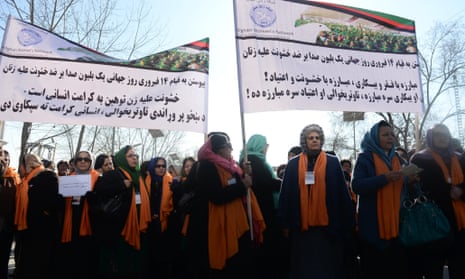Activists in Afghanistan have called on international donors not to neglect women’s rights when they meet with the government in Kabul this weekend to reaffirm their commitments to peace and development.
Women’s rights groups want to avoid another round of empty promises with little connection to the plight of ordinary Afghans.
Following the withdrawal of international troops, they worry human rights will tumble to the bottom of the agenda. With the Taliban gaining ground, security remains the priority for the Afghan government, diminishing political emphasis on rights issues.
Urging donors, including the UK, to make aid conditional on results, advocates say money should only be funnelled to ministries and institutions that show real progress.
“Any process that excludes women should not be supported by donors,” said Samira Hamidi, a former director of the Afghan Women’s Network.
About a dozen foreign delegations are expected to participate in the summit on Saturday, including a senior contingent from the UK’s Department for International Development (DfID) and a deputy secretary of the Australian Department of Foreign Affairs and Trade.
Since taking office, the Afghan president, Ashraf Ghani, has made strides to enhance female representation in government institutions. He has nominated the first woman to Supreme Court – though parliament rejected his first pick – as well as appointing four female ministers, four female ambassadors and two female provincial governors.
Activists regard these appointments as little more than window dressing, however, arguing that they placate international donors while failing to address systemic discrimination.
“Parties in embassies with female MPs and government officials is not promoting women’s rights,” said Wazhma Frogh, co-founder of the Research Institute for Women, Peace and Security.
On the contrary, Hamidi said, foreign embassies have done little to gauge opinion among Afghan civil society groups. “It is quite disappointing to see very little consultation and engagement with women’s organisations,” she said.
The senior officials’ meeting in Kabul follows up on previous conferences, in 2012 in Tokyo and 2014 in London, where donors and Afghan government officials agreed to take collective responsibility for the country’s future. It also marks another step in Afghanistan’s transition toward autonomy.
In London last year, Ghani outlined a vision for a self-reliant Afghanistan. But while his plan goes into granular detail about creating a sustainable economy, it is less specific on goals for human rights.
If Ghani’s scheme is realised, claim critics, donors will have to allow the Afghan government to skirt firm commitments. Without “measurable benchmarks,” as Human Rights Watch puts it in an open letter to DfID, progress will be harder to monitor.
International donors can put pressure on the Afghan government through the legal sector, which they heavily subsidise (pdf).
One event in particular has become symbolic for those who see the legal system as fundamentally rigged against women.
After the murder of Farkhunda, a 27-year-old female religious scholar who in March was attacked by a mob in central Kabul after an argument with a cleric, 49 people were charged, including police officers. Many of the initial verdicts, which included four death sentences, were later overturned or reduced, leading women’s groups to feel the authorities were trying to gloss over the incident.
This week, there was further outrage after a man and a woman accused of adultery were flogged 100 times in public in Ghor province. The governor of Ghor, Seema Jowenda, sanctioned the punishment, which was aired on television. Her spokesman told Reuters the punishment was in accordance with sharia law and would teach others a lesson. The Afghan government, however, does not enforce sharia law.
“Donors must condition their aid to the justice sector, and ask for immediate improvements,” said Hamidi. “Donors should not get influenced by the ambitious statements of the president. They should ask for real and immediate steps on the promises the president is making.”
Frogh said it would be better to withhold aid than to fund institutions that hamper the lives of Afghan women. “If the judge whose salary comes from international money doesn’t give us justice, they should not fund him,” she said.
With security the overarching issue on the agenda, advocates also criticised the government and its international partners for not committing firmly to increasing the number of women in the country’s police force.
Another central agenda point for the summit will be accountability to donors. The Agency Coordinating Body for Afghan Relief and Development, which seeks to mesh together the work of 135 NGOs in Afghanistan, recommended that ministers be held directly accountable for the funds they receive.
In a report on Thursday (pdf), a US congressional watchdog said corruption in the Afghan Ministry for Refugees and Repatriation had swallowed so much of the $950m allocated by the US to assist refugees and returnees that the US State Department had decided to cut the ministry’s funding.
